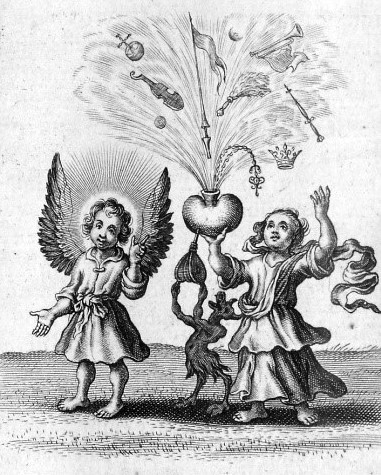1727 · Pistoia
by EPICTETUS — SANCHEZ de las Brozas, Francisco; CITARELLA, Marco Antonio (translators)
Pistoia: Biagioni & Franchi, 1727. 4to (203 x 143 mm). Two parts in one, separately titled and paginated: [32], 115, [1] pages; [10], 88 pages, 1 leaf. Half-title, title with engraved arms of the dedicatee, Eugene-Francis, Duke of Savoy (known as Prince Eugene), engraved plate: a portrait of the translator above his arms and titles, signed by [Giuseppe] Filosi of Venice. Woodcut initials. (A few sheets in part 2 browned.) Contemporary parchment over flexible boards, ms. spine title (soiled, stained, small tear in upper joint). Provenance: Adam Mabellini of Pistoia, purchase note on first title (Ex Libris Adam Mabellini Pistoriensis emit proprio [tre?]), his name repeated on front free endpaper along with pen trials & doodles, and on Spanish half-title; more scribblings on lower endleaves.***
Only Edition of an (indirect) Italian translation of the Enchiridion (Handbook), the abstract of Epictetus’ Discourses, allegedly compiled by his student Arrian. This Italian version by Citarella, duke of Castelvecchio, which seems only to have appeared in this edition, was made from the well-known Spanish translation by Sanchez (1523-1600), celebrated professor of Greek and Latin at Salamanca, which is reprinted in the second part. Citarella’s Italian follows Sanchez faithfully. Each of the short chapters of the Enchiridion is followed by Sanchez’s longer commentary; both parts also preserve Sanchez’s prologue and Vita.
Born a slave, and lamed as a boy, Epictetus (55-135 C.E.) brought little new to the teachings of the early Stoics, but he possessed his own method of teaching. “The programme of study and exercises that Epictetus’ students adhered to was in consequence different from the programme that was taught by his predecessors, but the end result, consisting in the special Stoic outlook on oneself and the world at large and the ability to ‘live the philosophic life’, was the same.” (K. Seddon, art., Internet Encylopedia of Philosophy).
The present edition may have been used in schools, to judge by the daydreaming scribbles of one Adam Mabellini, but it was not published for that purpose; rather, the translation was a labor of love. In a prefatory note to the reader, Citerella recounts that he had first read Epictetus, in Sanchez’s translation, at a low point in his (privileged) life, while idle on a Tuscan island where he had taken refuge from the “deceptions of this world.” The book (as it often does) opened his mind and revolutionized his attitudes. Wishing that he had read it in his youth, he decided to translate it for others. The preliminaries include 13 unsigned sonnets, attributed in the title to the translator’s brother Niccolò Citarella and “other Tuscan authors.” Citarella seems to have published nothing else.
OCLC locates 2 copies outside Italy (Birmingham & Manchester). ICCU ITICCUCFIE�22314; Harman, ed., Contributions toward a bibliography of Epictetus by W. A. Oldfather: a supplement (1952), no. 91 (p. 67). (Inventory #: 4178)
Only Edition of an (indirect) Italian translation of the Enchiridion (Handbook), the abstract of Epictetus’ Discourses, allegedly compiled by his student Arrian. This Italian version by Citarella, duke of Castelvecchio, which seems only to have appeared in this edition, was made from the well-known Spanish translation by Sanchez (1523-1600), celebrated professor of Greek and Latin at Salamanca, which is reprinted in the second part. Citarella’s Italian follows Sanchez faithfully. Each of the short chapters of the Enchiridion is followed by Sanchez’s longer commentary; both parts also preserve Sanchez’s prologue and Vita.
Born a slave, and lamed as a boy, Epictetus (55-135 C.E.) brought little new to the teachings of the early Stoics, but he possessed his own method of teaching. “The programme of study and exercises that Epictetus’ students adhered to was in consequence different from the programme that was taught by his predecessors, but the end result, consisting in the special Stoic outlook on oneself and the world at large and the ability to ‘live the philosophic life’, was the same.” (K. Seddon, art., Internet Encylopedia of Philosophy).
The present edition may have been used in schools, to judge by the daydreaming scribbles of one Adam Mabellini, but it was not published for that purpose; rather, the translation was a labor of love. In a prefatory note to the reader, Citerella recounts that he had first read Epictetus, in Sanchez’s translation, at a low point in his (privileged) life, while idle on a Tuscan island where he had taken refuge from the “deceptions of this world.” The book (as it often does) opened his mind and revolutionized his attitudes. Wishing that he had read it in his youth, he decided to translate it for others. The preliminaries include 13 unsigned sonnets, attributed in the title to the translator’s brother Niccolò Citarella and “other Tuscan authors.” Citarella seems to have published nothing else.
OCLC locates 2 copies outside Italy (Birmingham & Manchester). ICCU ITICCUCFIE�22314; Harman, ed., Contributions toward a bibliography of Epictetus by W. A. Oldfather: a supplement (1952), no. 91 (p. 67). (Inventory #: 4178)







![[Timaeus]. De universitate sive de origine mundi libellus](https://d3525k1ryd2155.cloudfront.net/h/135/542/1665542135.0.m.jpg)
